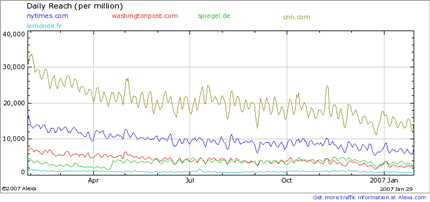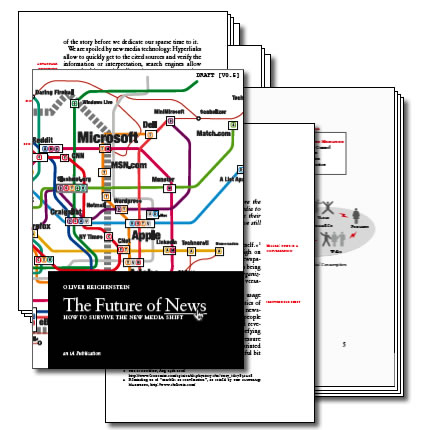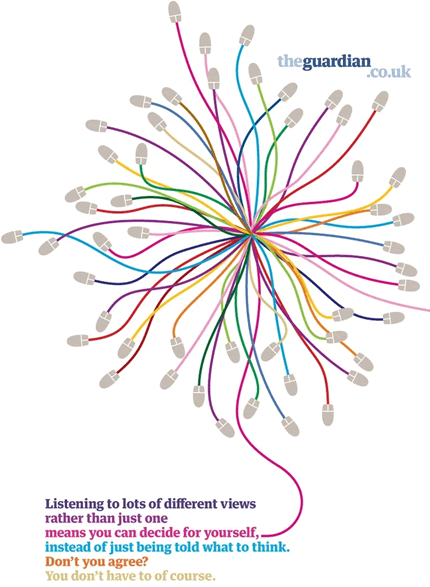News organizations cannot continue to ignore the global shift from institutionally-controlled media to user-controlled media. They have to redefine their processes and face the obvious question: Do we still need old media for news?


A) Enter
“A good newspaper is a country speaking to itself.” These are not the words of Internet junkie high on Web 2.0. This is Arthur Miller, defining newspapers back in 1961. If Miller is right about news being a conversation, the obvious instrument for organizing this conversation is the Web. It is fast, it is versatile, and it is by nature conversational.
There are obvious signs that the shift in media usage is irreversible. While access statistics of social media sites are going through the roof, newspapers are losing readers online and offline. Young people read more in total but read less printed matter. Ad revenue prognostics for the Internet point to a stupefying future while all other media are feeling the pressure already. In a special edition on the decline of printed news, The Economist stated that “the most useful bit of the media is disappearing. A cause for concern, but not for panic.” Given that it’s never time to panic, the question is: Concern for whom? For the reader or the publishing houses?

Threats
- Lowering reading experience. Printed text is nice. It’s nice to look at, to feel, to smell, and it is nice to read. Newspapers are handy in a train, cafe, at the hairdresser’s, on Sunday morning after your continental breakfast. So, yes, everyone that likes reading is concerned. Concerned not in regards to the quality of the information, but the quality of reading as an aesthetic experience.
- Losing journalistic quality. The implications of losing journalistic standards are disastrous for our democratic society.
- Severing cultural roots. The history of printed texts goes way back to the first papyri, the dead sea scrolls, Heraklit’s and Plato’s works, and first serially printed product: The Bible. Losing paper would be to lose a central part of that intellectual power and cultural magic.
Opportunities
Before answering to the raised concerns we should look at the causes for the change optimism within the new media community.
- Optimizing reading experience. Reading a newspaper is relatively stressful. Quality newspapers like the New York Times, The Guardian or Die Frankfurter Allgemeine Zeitung are—compared to web standards—considerably user unfriendly; they are comparatively hard to scan, the print is small, the editors are stingy with subtitles, the language snobbish and esoteric beyond necessity, reader comments come in days after the article is published, and the sources are hard to track. Newspapers refer to previous events and articles that not everyone follows, a 19th century data delivery holdover. We want to be able to quickly see if an article is worth reading. We want to see key points, sources, and the structure of the story before we dedicate our sparse time to it. We are spoiled by new media technology: Hyperlinks allow us to quickly access cited sources and verify the information or interpretation, search engines allow cross-checking, article discussions open perspectives to other people’s views on the subject. In short: The Internet is without doubt the most useful information resource—especially when it comes to news. And not just for readers. Contemporary journalists can see what effect their writing has, and learn and improve with every article they write.
Improving democracy. Old media losing its edge is not as bad as it may seem. Being a one-way medium, old media can be easily controlled by money, power, and superstition, and misused as a powerful tool for propaganda. “If the death of old media means that we don’t have to deal with the broad media manipulation of Rupert Murdoch and Silvio Berlusconi, that is good news for democracies.” It’s common sense news should not be owned in a democratic state. News should definitely not be owned by people using their media ownership to influence public opinion in their favor. Where there is open debate, the main channels of political manipulation are under heavy attack. Of course the Chinese government tries to control the Internet, of course Fox News tries to smear and defame interactive media. But smearing and controlling won’t help in the long term. Unless the apparatchik finds a way to stop time, centralized mediation is doomed to fail. Pandora’s box is open.
Historic development. The integration of old media into new media is inevitable. It follows considerably solid law: “The content of a medium is always another medium.” That newspapers will turn into a luxury good within the next 10 years seems obvious. Paper cannot compete with either the production cost or production time of new media. That TV is going to transform and become part of the Internet is also technically obvious.
No matter how much Viacom sues YouTube, they have to face the fact that the days of institutional media control are counted. The best shot for Viacom would be to turn YouTube into another Napster. But remember what happened after Napster died—music piracy exploded all over the web. Today media is already largely controlled by the consumer. Media as a fourth power is common democratic theory. The success of Fox News in the age of global interactive communication is the swan song of old media.
One of the big mysteries of the Information age is the rapid increase in book sales. Why do people buy more books than ever? Simple: Literacy is increasing. Thus the need for real, printed text.
On the other hand the need for Radio and TV diminishes, as the Internet offers time-independent and thus much more usable forms of TV and Radio. The only media that cannot be fully integrated is print. That’s why it deserves special attention.
B) Control
Filter
The journalist’s job description has dramatically changed in the last 5 years. News is no longer launched. Stories are no longer made. The amount of information has grown astronomically and with it the need for quality content. To people that know both sides of media it is obvious that the journalists’ function is to filter the noise and make it understandable.
The market value of reliable filters has exponentially increased in the last couple of years. And it will go on being more and more precious. With the increase of the amount of information that is generated, Google becomes more and more valuable. Filtering information has replaced controlling it. Filtering is a very solid business, and it continues to be.
Respond
Bloggers are opinionated. On one side that makes them interesting and highly critical about whatever “the other camp” says (Mac vs PC, conservatives vs. liberals, Manchester United vs Liverpool fans). On the other side it makes them dubious and manipulative to the point of blatantly lying and cheating. That is why identity disclosure is an important part of the interactive game, such as when integrating user comments on your blog—if you lie and cheat, it backfires. You are held responsible for what you say online; it can destroy careers, severely harm corporate trust, and flatten sales.
Lying and distorting information is obviously a bad practice. But manipulated information on a trusted news source is both harder to spot and not a rare occurrence. Most bloggers are not expected to be “professional”, but news organizations are. Famous bloggers already work under similar scrutiny to a journalist at the New York Times (and really, good bloggers are journalists). Future journalists will be very shrewd at discovering information and crosschecking it, and will also have the guts to expose themselves to public opinion.
Future press has to become less biased and thus more independent. The best journalists will be independent freelancers screening and recompiling data online. All this means: Future newspapers will have to change their editorial process. Current editorials are much too dependent on the opinion of the editor-in-chief and/or whoever owns or sponsors the newspaper. Future newspapers need to make their editorial process transparent, and respond to reader input. The making of a news article must become a public process. This will greatly increase the quality and trust in published text.
The integration of social media into the writing process is a greatest opportunity for writers and readers since the invention of the press; the more intelligent the readership of a newspaper, the more intelligent the product will become.
Divide et Impera
Wikipedia proves that it works. The only question is: Which newspaper will allow their readers to participate in the writing of an editorial process first. Participating means: Readers influence the article from the beginning to the end—and beyond. The only way to do this is by turning the newspaper web sites into transparent public editorial tools.
Newspaper readers need to be organized just like a state. On top you have the editor in chief. On the bottom you have the passive reader. In the middle you have journalists and active contributing readers. In order to control trolls and spammers, readers choose and elect representatives among themselves. Some readers have more rights (and duties) than others, due to their qualifications as readers. Slashdot works just like that; and it works very well. Most forums don’t work because there is no organization among the readers.
C) Shift
Branding
Printed newspapers will shift into a luxury product, an amalgam of the best information that you created online. Both products need to be extremely easy to read and incite the user constantly to go online and contribute to the next edition. The branding must support the use of each media (online: contribute, offline: enjoy); both mediums need to constantly refer to each other.
- Use the same design elements on- and offline.
- Stop giving your website the silly and disqualifying “Online” attribute. Online news should be as reliable and brand-worthy as your print edition.
- Show in print which words are links in the online edition by either underlining linked words or coloring them. Links in print make sense as links usually denote keywords that help the user scan and thus quickly understand the article.
Information Design
Newspapers will have to focus on their online editions and learn from successful information resources such as Google News, Techcrunch, Memeorandum, Robert Scoble, and Jakob Nielsen. Successful websites not only prove that relevant, well-made online news does have a solid future, they also show how it’s done. Here are three simple rules:
- Dramatically increase font sizes on and offline. Use white space (digital white space is cost-free).
- Care as much about online layout and typography as you care about printed information design. Sloppy information design is insulting the intelligence of your users.
- Use more paragraphs and subtitles in print.
- Use sidebars for additional information online, instead of trying to distract users with ads and “other interesting stories”.
- Stop packing pages with other articles or annoying advertisement.
- Write simple, write backwards (the most important information first).
Advertisement
Locking away your articles is not smart. It is technically ignorant and financially stupid. How much money do you make from paid access? How much money would you make if you sold ads on those old articles instead? Yes, it is that easy.
- Reduce the number of banners per page to one.
- Increase the banner size.
- Distinguish clearly between ads and content.
- Kill all pop-up windows.
- Forbid animated and amateurish banners.
- No Google or other cheap-looking ads.
- Hire sales staff to sell proper advertisement instead of whining that there is no money online.
- Care as much about increasing the quality of online advertisement as you care in print.
- Sell the books you cite, the CDs and DVDs you discuss, the T-shirts from fashion designers you write about…
- Sell print and online ad space together.
- Value of print advertisement: Presence. Value of online advertisement: Same.
- Continuously reduce the cost of print ads and raise the cost of online advertisement at the same pace.
Interaction
Letters to the editor is often the most successful section of a newspaper. Why is that? Because the curiosity in what real people think is human, all too human?
Comments on articles made on the website need to be integrated into print the very next day. Right beside the article. This will incite the reader to go online and write smart comments. This will also help recruiting the reader as a marketer.

Let your reader write articles. Who knows more about car engines than a mechanic? The engineer? Who knows more about hairdressing than hair dressers? The fashion journalist? Who knows more about art than artists? The art critic? Give real people the opportunity to write about what they know best. Their profession, their passion, their dearest concerns. This is interesting, and if a professional editor works it over it will be a fantastic read. Reward your most talented readers by printing their articles. “Man, did you see my article in the New York Times yesterday?” And here is how it’s done:
- Motivate readers on and offline to write quality comments and articles.
- Reward the most talented commentators and writers for their contributions with a remarkable writer fee and by printing their articles and comments: These readers will become your biggest fans and most passionate marketers.
- Print comments the next day or turn intelligent comments into online articles. Print very intelligent comments as separate articles.
- Integrate your readers in the news-generating process by allowing them to have insight in and input on upcoming articles.
- Create a section called Informants Wanted.
Technology
Opening the archives is not enough. You have to link new news to related old news. Good newspapers are intelligent soap operas. Why do you make it so hard for your reader to review the old episodes of the amazing macho show The War on Terror, or the award-winning political thriller series Scooter Libby, or the famous tragedy Britney Spears?
- Use the best editorial tool around. The most powerful multi-user CMS system, engaging intelligent users in collective content creation, is Wikimedia. All you need is a good information designer that cleans up the currently somewhat messy user interfaces.
- Wiki technology allows us to collectively edit, discuss, cross-link, and easily follow a story back to its roots. Wikis done well could turn newspapers in to an information wonderland.
- For print: Use better print quality, and better paper.
D) Escape
There is no escape, there is only adaption. Sooner or later online news will replace up to 95 percent of printed news. Printed news cannot compete with either the production speed or reproduction cost of digital media—this in itself is a killing economical argument.
The true reason though is that digital news is more useful and democratic and thus more appealing to a democratic society. The end of old media is, all in all, a positive and overdue socio-political development. Old-school editors that try to resist the inevitable change happening throughout all levels of society “will be punished by life”.
The only thing websites cannot and will not be able to compete with in the near future is the physical presence and the magic of printed text. Instead of using that edge and leveraging it with the intelligent power of social media, newspapers comfort themselves with user-repulsing information design in print, and an often disastrous online presence. Truth is: We need paper for books, yet we don’t absolutely need paper for news—it is just a nice-to-have option.
If newspapers adapt and change their processes soon, the online edition can (re)establish itself as a reliable data filter in its democratic function as a center of political debate.
Paper is not going to lose its cultural-historic magic. In the contrary, the less paper we use, the more it regains its preciousness. The print edition of a newspaper can become a premium product that incites users to contribute online. In order to establish itself as this info extravagance, it needs to learn contemporary information design principles and significantly improve its interface. Newspapers that manage to join online and print soon will get significant advantage over the competition.
Reading paper is an extraordinary experience. Discussing news online is highly addictive. If news organizations manage to leverage and connect both powers you have a chance to escape oblivion and re-occupy one of the many future centers of public attention.
Addendum
Read our follow-up article on what a newspaper as a wiki would look like: Washington Post Redesign as a Wiki.